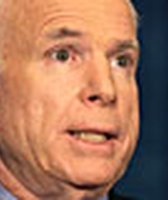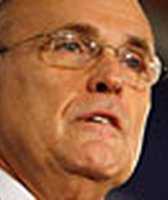Get PolitiFact in your inbox.
SUMMARY: Fred Thompson has a story to tell about a humble childhood and factory work as a teenager, and it all sounds real.
Like most good Southern yarns, the Fred Thompson story is steeped in legend. His small town upbringing in Lawrenceburg, Tenn., is humble and distinct on a campaign trail worn by front-runners in suits that match their polished images.
In his methodical drawl, Thompson mentions his early years at every opportunity -- from his announcement speech Sept. 7, 2007, in Des Moines, Iowa, to his Oct. 15, 2007, appearance on Fox News. The details sometimes differ but the effect is the same.
"My story is an American story," Thompson, 65, said in Des Moines, "one that's happened many times across this great nation of ours, where a kid of modest means from a little town without a whole lot of resources or even a whole lot of ambition when he was a kid, had the opportunity to do some great things …"
"I've seen it from a lot of different standpoints," he continues. "I've seen it from the factory floor when I was working the graveyard shift and we'd have lunch there on the change of the shifts and I'd be ankle-deep in water at the Murray Ohio bicycle plant where I was running a machine that was so loud I couldn't hear myself yell if I wanted to. And I've had the opportunity to dine with foreign leaders in foreign capitals around the world and just about everything in between."
This working-man persona, set against his experience as a lawmaker, lobbyist and Hollywood actor, is at the core of his efforts to win the White House with the help of the same blue-collar voters President Bush drew in previous elections. But the story's potency is only as good as its authenticity.
Confirming a tale with facts like these from nearly 50 years ago is difficult, to say the least. The former U.S. Senator's campaign can't provide independent verification of any of the details, only saying they "don't know anything beyond the stories I've heard him tell," Jeff Sadosky, campaign spokesman.
Interviews with more than a dozen folks in Thompson's hometown, who either knew him or worked with him at the Murray manufacturing plant in 1960, indicate that his stump speech story is largely true. Thompson was born in the Deep South town of Sheffield, Ala., just across the state line from Tennessee, where he spent his childhood. The son of a used car salesman, he hung out in the town square and played football and basketball. As a teen, he took his first job as a lifeguard at Rotary Park, according to the campaign.
"That's the way we did it in Lawrenceburg," said Jan Clifton, 66, who grew up next door to Thompson. "A lot of us, our parents thought we needed to work."
A year later, he married a local girl, Sarah Elizabeth Lindsey, who was a year older. About seven months later Thompson became a father to his first son, Tony.
Thompson doesn't shy from these difficult beginnings. "I started out -- I was a father. I was a teenage father who started working. I was working in a factory, I borrowed and worked my way through school …" he told Neil Cavuto on Fox News.
The time Thompson highlights most often on the stump is his short stint on the assembly line at Murray. The massive - by some estimations about 60 acres - plant opened in 1956 and provided the backbone of the Lawrence County economy, employing nearly one in every 10 people at its heyday, said Cromer Smotherman, Murray's first employee and plant historian who published a book called 'The Partnership.'
Few former workers can actually say they remember seeing "Freddie," as he is known in his hometown, working on the assembly line. But they recall he was one of the dozens of local boys who worked at the plant as temporary employees after school let out.
These employees would typically work the third shift (11 p.m. to 7 a.m.) that none of the full-timers on the morning shift wanted, said Bobby Alford, a 76-year-old who played basketball with Thompson and helped coached his youth league baseball team. Alford started at the factory the year it opened and worked, by his own count, 37 years, two months and 28 days.
The plant closed in 2005.
Best anyone remembers, Thompson worked there for just a few months the summer of 1960 before starting at Florence State College in the fall. He worked days at the local post office, friend Tom Crews said.
"Back at that time Freddie was working at Murray we would employ students who were planning to go to college. We called them seasonal or temporary employees," said Smotherman, 82, who retired as the chief operating officer, in a telephone interview from his nursing home room in Lawrenceburg.
It's pretty well remembered that Thompson worked the graveyard shift, and some of the other working conditions he describes seem accurate.
Nelda Morrow, a 48-year veteran of the factory, said the noise of the presses stamping out steel parts could be deafening. And Ronnie Perry, 63, says factory bosses didn't make employees wear ear plugs back in those days.
But no one can pinpoint what Thompson is talking about when he says he worked in ankle-deep water. The factory rarely flooded, though the large flat roof would sometimes leak.
"I don't know why he said that," said Doyce Shaddix, who worked Murray for 43 years. "It wasn't like it happened all the time."
Minor details notwithstanding, the larger theme Thompson preaches about his Everyman roots remains attractive to many voters. Clifton, his childhood friend and now major supporter, said his upbringing is his best quality.
"He's the people's candidate," she said. "I believe he can relate to people because he worked his way up."
Our Sources
Fred08.com Thompson speech Des Moines, Iowa, Sept. 9, 2007.
Transcript, Your World with Neil Cavuto, Fox News, Oct. 15, 2007.
Research help from Kathy Niedergeses, Lawrence County Archives, Lawrenceburg, Tenn., Oct. 5, 2007.
Interviews with Jeff Sadosky, spokesman for Thompson campaign.
Interviews with Thompson friends Jan Clifton and Tom Crews.
Interviews with former Murray Ohio workers Cromer Smotherman, Bobby Alford, Ronnie Allen, Ronnie Perry, Carl Alexander, Nelda Morrow, Davey Jolly and Doyce Shaddix.
Biography, Fred D. Thompson papers,1993-2002 University of Tennessee Special Collections Library.







































